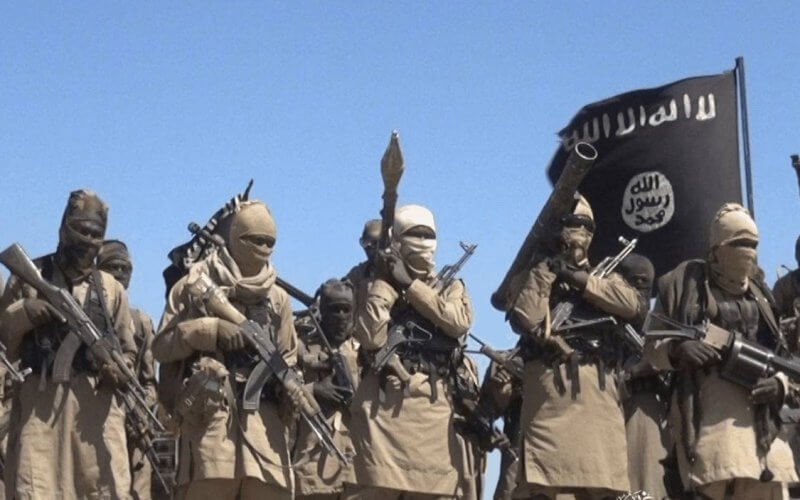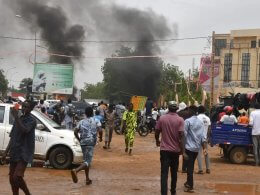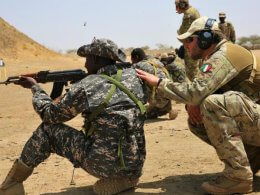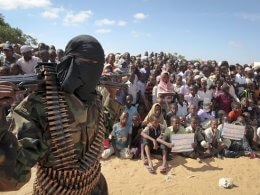By: Max Primorac, The Daily Signal
As the Middle East is again consumed by wars of terrorist aggression, Africa, too, is experiencing a rise in violence. Despite the region receiving billions in U.S. foreign aid annually, groups affiliated with Al-Qaeda and the Islamic State have gained ground throughout the continent.
As of 2023, the Sahel region—a broad sub-Saharan swathe of land stretching from the Atlantic to the Indian Oceans—represents 43% of all global deaths caused by terrorism. This is a 7% increase over last year, with no signs of abating.
All of this chaos has helped American adversaries like China and Russia gain stronger footholds on the African continent—a continent rich in natural resources critical to U.S. commerce and national security, but a sanctuary for terrorists who seek to attack America and our allies. It’s also a place where people deserve better than terrorism, violence, and authoritarian dictators. Yet U.S. influence in the region has declined since the Biden administration took office and rolled out a tremendously weak Africa strategy.
Formed as a faction of Boko Haram—the terror group made infamous by its 2014 kidnapping of 276 Nigerian schoolgirls (of whom 98 still remain in captivity)—the Islamic State West Africa Province is active in northeastern Nigeria and the neighboring Lake Chad area. With an estimated force of 5,000 fighters, Islamic State attacks anyone who opposes its extreme Salafi interpretation of Islam, while funding itself through kidnapping and extorting the local population.
To the west is Jama’at Nasr al-Islam wal-Muslimin, an Al-Qaeda-aligned group active in Mali, Niger, Togo, Benin, and Burkina Faso. The group focuses its attacks on security forces and political figures. In 2019, the terror group attacked a United Nations base in Mali, killing 10 peacekeepers and wounding 25 others.
The U.S. Department of State has designated both Boko Haram and Jama’at Nasr al-Islam wal-Muslimin as foreign terrorist organizations.
Central Africa is no exception. In countries such as the Central African Republic, the Democratic Republic of Congo, Uganda, and Rwanda, Islamic State-affiliated groups such as the Allied Democratic Forces threaten security forces, U.N. peacekeepers, and civilians.
In the Horn of Africa, the terrorist group Al-Shabaab continues to operate in Somalia, Kenya, Ethiopia, and Mogadishu. The federal government of Somalia has struggled to contain the group, which now controls large swathes of land. Al-Shabaab came to fame for its notorious 2013 attack on a Kenyan shopping mall that killed 60 people. Its goal is to establish a radical Islamic caliphate in the region.
Following President Barack Obama’s takedown of former Libyan strongman Muammar al-Gaddafi in 2011, that country’s massive arsenal of weapons and fighters went into the Sahel region, especially to Mali and Niger, and proved a boon for regional terror groups. Endemic political instability and conflict followed, leading to humanitarian crises, economic contraction, and mass flows of fleeing emigrants north into Europe.
Al-Qaeda- and Islamic State-affiliated groups are both the cause of and exploit the chaos. They recruit local and unemployed youths and spread their extremist ideologies beyond Africa.
Since January 2020, there have been 13 coup attempts in Africa—six successful—reflecting increasing global instability since Joe Biden became president and his administration chose to focus on promoting climate, gender, and racial ideologies overseas.
“The reversal of democratic gains runs parallel to insecurity that West Africa and the Sahel have been facing for some time now,” said Omar Touray, the president of the Economic Community of West African States.
Meanwhile, regional instability, dictatorship, and corruption in countries with an abundance of natural resources have drawn the attention of global malign powers. Under the auspices of “counterterrorism,” Russia’s paramilitary Wagner Group props up authoritarian regimes with “security advisers” and security forces that fight against these terror groups in exchange for profitable mining permits, especially gold mines.
“It was only supposed to be a few weapons and instructors, but when the Russians arrived, they saw the state of chaos in which our country is and thought that they could also do business, set up companies, buy raw materials, exploit mines. … They came. They saw. They took advantage,” said Cardinal Dieudonné Nzapalainga, the Metropolitan Archbishop of Bangui, Central African Republic.
With terror-sponsored violence gripping much of Africa, Western companies are loathe to invest there, providing Communist China a clear path to serve as the continent’s banker. China’s Belt and Road Initiative, Beijing’s trillion-dollar signature infrastructure-building program to displace the United States as the global superpower, gives it access to Africa’s natural resources, including half of the world’s gold and 90% of the world’s cobalt, an essential component of lithium-ion batteries.
In Djibouti, China built its first overseas military base at one of the most strategic shipping routes in the world, providing it access to maritime routes connecting the Mediterranean Sea to the Indian Ocean via the Suez Canal.
While China’s influence grows, U.S. influence in the region has declined since the Biden administration issued its much-touted Africa strategy—a strategy that prioritizes an ideological agenda divorced from Africa’s economic needs and America’s national security interests.
Terrorism in Africa is a complex and multifaceted challenge. Certainly, more investment in education, infrastructure, and job-generating industries would help address the social, political, and related economic grievances of the civilian population that are constantly exploited by the terrorists. The failure of the West to effectively assist Africans to defeat these terrorist groups, however, makes economic development and social progress nearly impossible.
To reverse course requires the administration to adopt a new Africa strategy that prioritizes robust security assistance over progressive ideology, more commercial diplomacy to counter China and other malign actors’ penetration of the continent, and a foreign aid approach better aligned to U.S. national security outcomes.










